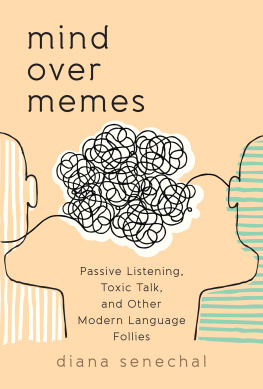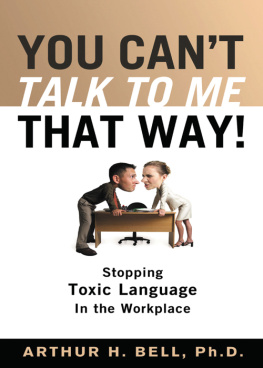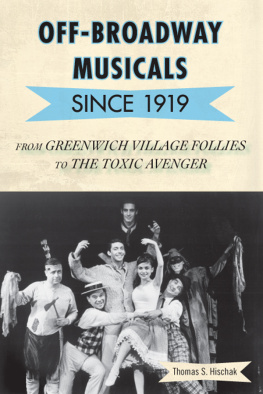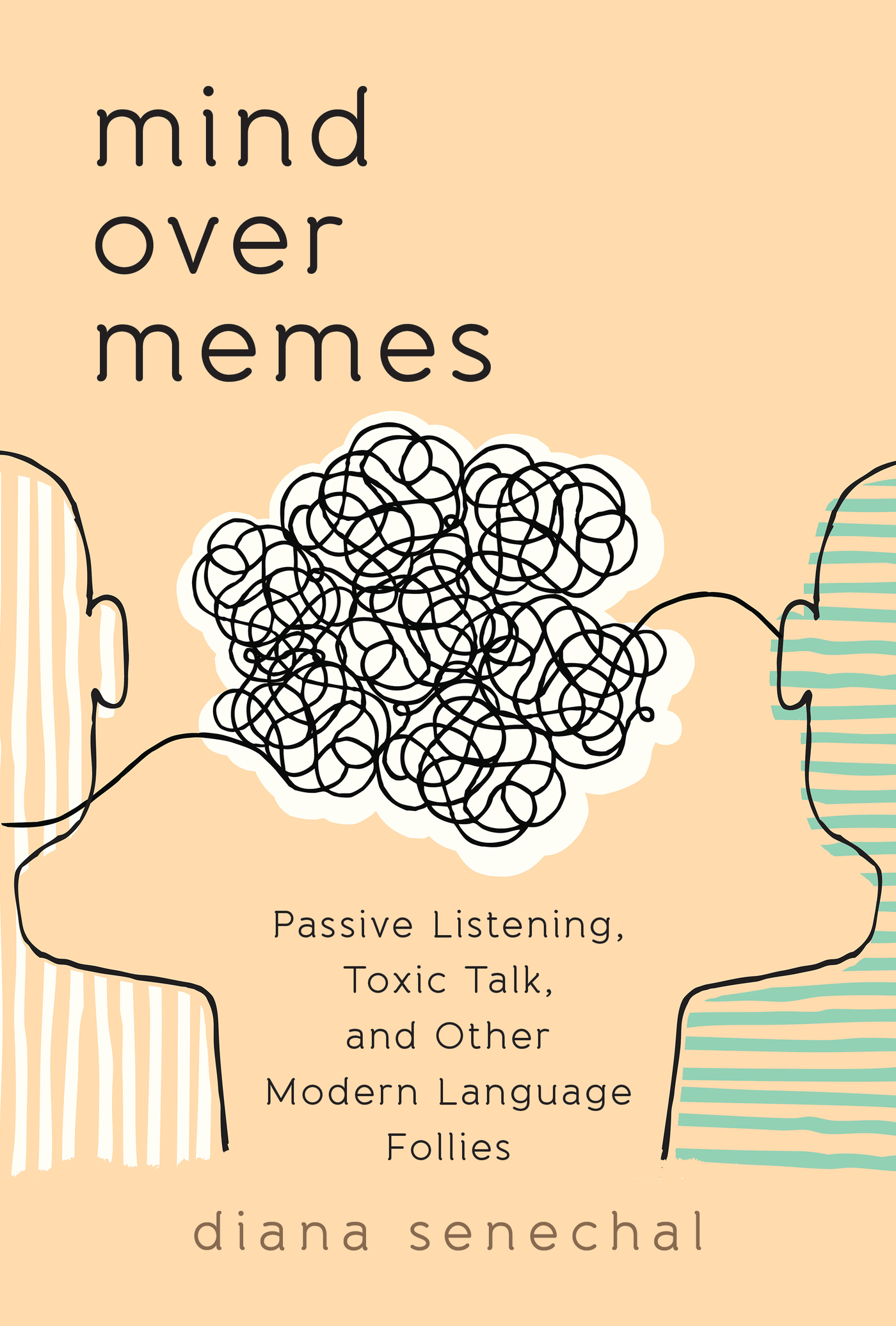Mind over Memes
Mind over Memes
Passive Listening, Toxic Talk, and
Other Modern Language Follies
Diana Senechal
ROWMAN & LITTLEFIELD
Lanham Boulder New York London
Published by Rowman & Littlefield
An imprint of The Rowman & Littlefield Publishing Group, Inc.
4501 Forbes Boulevard, Suite 200, Lanham, Maryland 20706
www.rowman.com
Unit A, Whitacre Mews, 26-34 Stannary Street, London SE11 4AB
Copyright 2018 by The Rowman & Littlefield Publishing Group, Inc.
All rights reserved. No part of this book may be reproduced in any form or by any electronic or mechanical means, including information storage and retrieval systems, without written permission from the publisher, except by a reviewer who may quote passages in a review.
British Library Cataloguing in Publication Information Available
Library of Congress Cataloging-in-Publication Data Available
ISBN 9781538115176 (electronic) | ISBN 9781538115169 (hardback : alk. paper)
 TM The paper used in this publication meets the minimum requirements of American National Standard for Information Sciences Permanence of Paper for Printed Library Materials, ANSI/NISO Z39.48-1992.
TM The paper used in this publication meets the minimum requirements of American National Standard for Information Sciences Permanence of Paper for Printed Library Materials, ANSI/NISO Z39.48-1992.
Printed in the United States of America
To my students at the Columbia Secondary School for Math, Science, and Engineering in New York City and the Varga Katalin Gimnzium in Szolnok, Hungary.
Acknowledgments
I am indebted to the following individuals and organizations:
My editor at Rowman & Littlefield, Stephen Ryan, who welcomed the proposal and drafts, gave me wise advice, and saw the project through to completion; and Jessica McCleary, the production editor, who guided the words into print;
My dear friend Joyce Mandell, who read and commented on chapters of the book;
Miriam Nightengale, the principal of Columbia Secondary School, who understood and supported this project;
My relative Robert Charles Fischer, for his story about his grandfathers book prop;
Cantor Perry Fine, whose cantillation course stays in my memory and who read and commented on the fourth chapter;
Samuel Hope, executive director emeritus of the National Association of Schools of Music, for encouraging me in my work and inviting me to speak;
My colleagues at Columbia Secondary School and at the Varga Katalin Gimnzium;
My students in philosophy, language, and literature classes and all the students who shaped and filled the philosophy journal Contrariwise;
Dr. Nimet Kk, who invited me to teach in May 2017 at the Sainte Pulchrie Lisesi in Istanbul;
The Dallas Institute of Humanities and Culture and the Association of Literary Scholars, Critics, and Writers for involving me in their vital work;
All those who have inspired my Jewish life and encouraged me in cantillation and more;
All my teachers, witting and unwitting;
And my friends and family, without whom I could not do.
Introduction
We live in an era of the Big Idea (which often is not much of an idea at all): a snappy concept that appears to solve social and personal problems. A book or TED talk comes along that seems to explain everything (or at least a good chunk). People seize the takeaway, propagate it, and reduce ideas and history to fit it. I have heard people speak of critical thinking with uncritical admiration, about creative disruption as though it had released the collective genius, and about grit as if it gave the earth an extra push around its axis. The concept of a teamgood for certain times and placeshas come to take over all associations, all group relationships. If you suggest, at a meeting, that not everything is a team, you get a puzzled look or a sympathetic laugh. Then the meeting continues: All right, team, lets move on to the next item. You find that a meatier (not teamier) critique is in order.
What happens when you begin questioning the language around younot just casually, but intently? First, you can never return to it as you knew it before. Words carry grief and joy, history and impulse, help and danger. Having forayed into language, you become, in a sense, its exile. Yet this alertness to language leads to associations as well, with people who likewise question what they say and hear.
Second, you find that you must live out your questions. To question language is not simply to poke fun at it, although jokes wait in the wings. You bear the consequences of words. Clichs take over if you do not guard against them. You hear of the bottom line, moral imperative, safe space, American values, and such things; if you let them pass by without scrutiny, you will hear them again later, in louder vowels, after they have gorged on the world. You will then find it harder to get a word in edgewise, as they will crowd out every edge.
In any timebut especially in a time of memes, retweets, aggressive personalized marketing, and news gone virala skeptical, self-educating mind upholds democratic forms. Democracy requires agency; to participate in government, at any level, you must be able to work with words and grammar, construct arguments, spot fallacies, and perceive ambiguities and uncertainties. You must also respond intelligently to criticismconsider it, learn from it, and single out its wisdom. Language does not come prepackaged; to use it well, you must tousle with it, looking for the right words and combinations. It is not enough to point the finger; democratic criticism must involve full conscience. When critics seek truth, language opens its leaves. Such seeking need not take scholarly or political form; it can occur in song, technology, or reverie. It keeps pushing beyond certainty and ease, beyond its own version of the world.
From 2011 to 2016, I created and taught a sequence of philosophy courses at Columbia Secondary School in New York City. In the ninth-grade course (Rhetoric and Logic), students often asked me, What does rhetoric have to do with philosophy? I replied that language can help or hinder our pursuit of truth. To illustrate this, I gave an assignment. Students were to write about a concept, word, or phrase that they thought had been misused or misunderstood. In three paragraphs, they were to explain the nature of the misunderstanding, discuss the implications, and propose a different understanding or phrase. The results were so compelling that I made this an annual tradition in my classes.
Students wrote probing essays on happiness, courage, college and career readiness, Itll all be OK, and other expressions. Within these short compositions, possibilities multiplied and meanings grew. I came to see this as not only a useful assignment but a vital practice. Whoever peers into words becomes sharper and more skeptical of speech. For the sake of meaning, fun, and resistance, I decided to take up the same exercise in longer form. This discipline and play led to the current book.
Each chapter in this book takes up a word, phrase, or concept; criticizes its current usage; and proposes a new approach to the word or words. The chapters delve into music, literature, education, and other enduring subjects; in doing so, they take language beyond its quick rewards. To understand words well, one must hear them, not only in the moment, not only in current usage, but through time, subject matter, and solitude. One must perceive beyond the immediate present, beyond monotonic choruses of agreement and rebuke.
The title Mind over Memes suggests a human ability to think about the language we use instead of automatically adopting it and passing it on. The subtitle,
Next page










 TM The paper used in this publication meets the minimum requirements of American National Standard for Information Sciences Permanence of Paper for Printed Library Materials, ANSI/NISO Z39.48-1992.
TM The paper used in this publication meets the minimum requirements of American National Standard for Information Sciences Permanence of Paper for Printed Library Materials, ANSI/NISO Z39.48-1992.